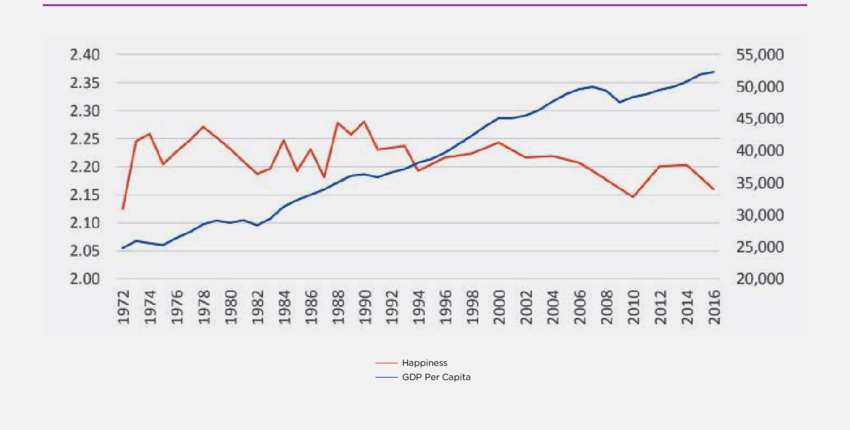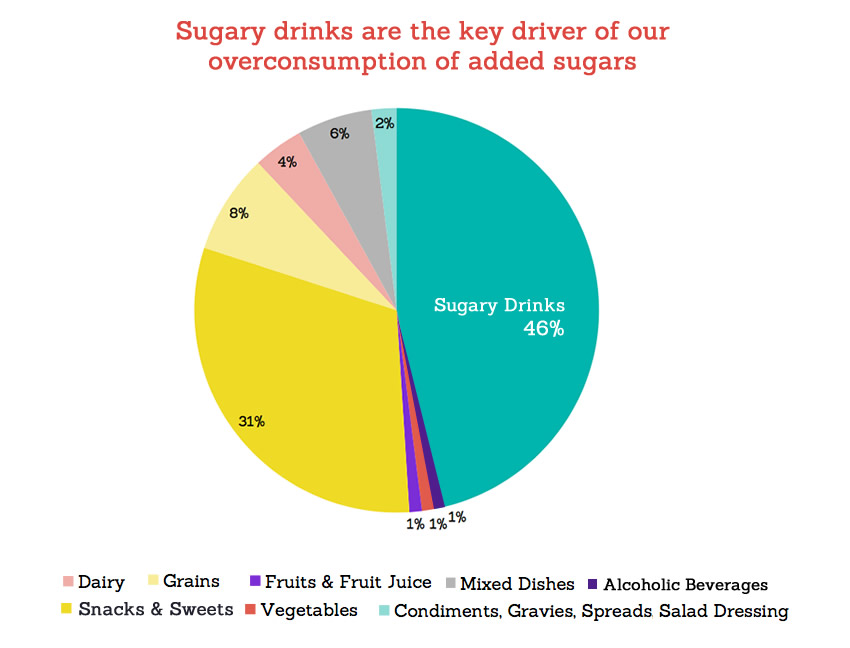Increased productivity Has not Translated to More Freedom
In todays world, the vast majority of people are dependent on their employers for their income. But how did we become so much more productive than our forefathers while still being dependent on our employers? This is the result of the feeling that more and more of our conveniences and luxuries are necessities over time. A hundred years ago much of what we consider necessities were either non-existent or rare: phones, televisions, internet, air conditioning, large sized homes, garages, etc. Nothing wrong with any of this but it leads us to become dependent on our employers for our day to day living. Thus, if most of us were to stop working, within a matter or days or at most months, we would run out of money. This state of financial reality results in some big consequences for society as a whole. If we were becoming happier, we could say it was still worthwhile but the data actually shows the opposite is true:

Helliwell, J. F. (2018, March 14). World Happiness Report 2018. The World Happiness Report. https://worldhappiness.report/ed/2018/
What is going on?
Why we Willingly Sell Harm to Customers for Profit
Upton Sinclair wrote, “It is difficult to get a man to understand something if his salary depends on him not understanding it.” In other words, we are too easily ready to compromise our integrity and deny reality if that is in our financial interests. A classic example of this was the tobacco industry in the 1980s and 90s. Because they had a vested financial interest in assuring the public of the safety of their product, they were motivated to reassure the public that smoking was not as bad as it is made out to be. Now we could rightly blame greedy executives in this case who ought to have acted differently. We can and should hold them accountable for their public mis-leadings.
The executives at these companies were almost certainly deliberately misleading the public and not just naively believing their own rhetoric. But what about the employees of these companies? Did not really not know that what they were helping to sell was harmful for the public? Were they willfully denying reality to in order to put some cash into their pockets? Or were they not bothered by harm they were inflicting on the public?
In one way, its easy to understand the predicament these employees were in. They have to put food on the table for themselves and their families. How could they just quit their jobs in the name of doing good for society? Of course, they need to put their families first. It would not be right not to.
The Problem is We Depend on our Salaries
But this is exactly the situation Upton Sinclair was talking about. In this case, most of us would continue to work even when our work brings harm to others. But Sinclair was not exactly right either. For most of us (admittedly with some exceptions), it is not just that we are willing to blindly believe whatever if our salaries depend on us denying reality in some way. It is more that we are dependent on our salaries that makes susceptible to justify the work we do. If we were not dependent on our salaries, then fewer of us would so readily look the other way to the harms we inflict with our sales.
Think about this for a minute. Suppose you worked at Coca-cola. This is an employer not exactly known for providing a benefit to society. They and their fellow soft drink industry competitors on the whole are part of the reason for the rise of obesity and certain chronic diseases in America.
One way to address the obesity epidemic is to regulate how much sugar can be added to soft drinks or limit the size of soft drinks sold. That might even work to reduce sugar consumption to some degree. But there is a better option.
Just imagine if most of us were financially independent of our employers. Imagine if you’re a worker who is suddenly financially independent of your employer (Coca-cola in this case). Would you continue to work for that employer? I bet almost certainly you wouldn’t.

2009-2010 data from US Department of Health and Human Services and U.S. Department of Agriculture. 2015 – 2020 Dietary Guidelines for Americans. 8th Edition. December 2015.
Financial Independence Translates to a Better Society
Suddenly, in the first place you think about how monotonous your job is. You also think about how your job is to hook young children on this artificially created product in order for your company to make profit. You question what is the point of working at this company. If you could afford to quit and never worry that you would run out of the money you need to sustain your day to day living, I believe many people would do so. They may choose to stop working altogether or take on a job they find more meaningful.
Just suppose for a minute that most people (perhaps 50-60% of our working age people) were to become financially independent of their employers (which I argue is entirely reasonable and probably even an underestimate of what is possible). You’ll still have the greedy executives at Coca-Cola trying to squeeze profits without any hint of guilt for the harm they are inflicting. But now, in this imaginary scenario they have much fewer employees that are willing to work for them. The result is that Coca-cola company shrinks in size. That alone benefits society.
The reality is that our way of living rewards companies that bring harm to ourselves and our children. Is it just me or isn’t that crazy? Shouldn’t we be rewarding those who bring a benefit to society instead? I know there’s a lot of things in our world that don’t make sense but this is fundamental. Let me be clear before I hear (yet another) accusation of being a communist or a socialist. I’m a fan of capitalism (future blog post on this topic). The system works. The problem is mindless consumerism. This is what leads to all sorts of unintended consequences for society.
More Regulations is not the Answer!
Our way of correcting for this is to introduce all sorts of regulation. We then have to regulate sugar intake, pollution, chemical exposure, food companies, animal welfare, etc. I’m not against regulation, sometimes it is necessary and impactful. But if could address mindless consumption, we shouldn’t need to regulate everything. We are not naturally inclined to indiscriminately harm others for our own profit. But if our backs are up against the wall and we have to do so to put food on the table for ourselves and our families then yes, we’ll do what we need to do and justify it without a second thought. But a person who is financially free of their employer is suddenly able to see clearly and is less willing to compromise their own integrity for the sake of profit. The fact is, most people should be able to become financially independent were it not for mindless consumption that has led only to increasing levels of unhappiness.
